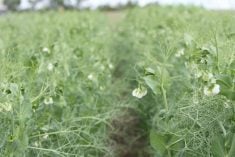Whoever won the federal election (I’m writing this before the results are in), there will be no time for a victory lap or a long, defeated sobbing episode, at least for the International trade and foreign affairs ministers, old and maybe new.
Canada has a tiny window of opportunity to try to defend some new agriculture sales this country has been making to Japan, and to increase and protect sales to other Trans-Pacific Partnership nations.
I realized this while pondering some analysis the Canada West Foundation has been working up as it looks at the impact of the United States-Japan trade deal and the likelihood that the U.S. will use its relative power to establish other bilaterals with TPP nations, stealing Canada’s present preferential access into those markets.
Read Also

Phosphate prices to remain high
Phosphate prices are expected to remain elevated, according to Mosaic’s president.
“Stealing” isn’t an exaggerated term in relation to the U.S.-Japan deal. It seems pretty clear that the deal is a violation of World Trade Organization rules that stop signatories inking limited quid-pro-quo deals outside a comprehensive trade pact. But our crying about it will resolve nothing. U.S. President Donald Trump has undermined the WTO and driven it to the point of seizure as it falls so far short of adjudicators that it will soon not be able to rule on trade violations.
As the CWF’s Carlo Dade has pointed out, and that I have reported in this newspaper, Canada has a time-limited opportunity to move into lucrative markets that the U.S. unwisely spurned when Trump tore up the U.S. participation in the original TPP.
That advantage has been readily apparent with Canadian agriculture trade to Japan, which has soared in some commodities since the deal was completed. Some types of beef exports have increased more than 100 percent, barley exports have greatly increased and pork sales have surged about 10 percent.
But that could all evaporate when the U.S.-Japan deal takes effect, which could be in January. (The deal doesn’t need the approval of Congress.)
The agreement gives the U.S. the same access to the Japanese market that the TPP gives Canada today. There will be heavy pressure on the Japanese to buy American ag goods, to mollify Trump, so it might not be just a level playing field again. The U.S. might have an advantage.
That’s why, for the good of Canada, our trade-related politicians need to get over to Japan ASAP, if just to keep that trade relationship warm and improving.
And they, their departments, our ag exporters and farmers all need to be making a concerted effort to boost sales to the TPP region while we still have an advantage over the U.S. That advantage will likely disappear over time.
Canada also needs to be able to immediately execute on new access we get to other Asia-Pacific nations when they join the TPP.
In its analysis, the CWF highlights the enormous amount of preparatory work it takes to get products and industries ready to export to new or expanded markets, so that work should be happening now, not after a deal is signed with those in the TPP queue. (Anybody who, like me, is disappointed by the reality of the Canada-European Union trade deal can see how difficult it can be to take advantage of new trade access.)
Canadian farmers are lucky that Trump is distracted by the impeachment investigation, the trade war with China, colourful moving lights and Fox News presenters but that distraction won’t stop his trade officials from trying to move forward with bilateral trade deals.
So no matter how hurt or happy Canada’s international trade politicians are post-election, they need to serve this nation’s farmers and get overseas fast, while we still have rewards to reap.
















